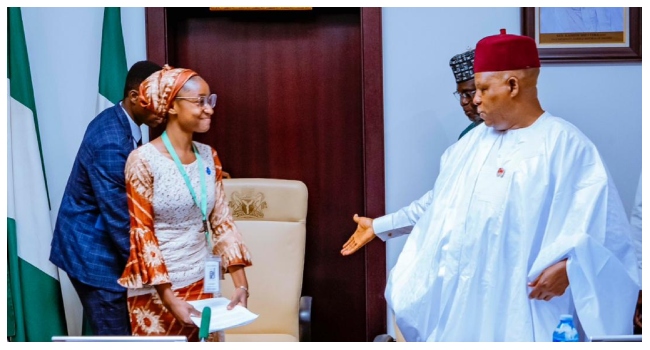
Pius Nsabe
Sitting in the plush seat of Nigeria’s Vice President at the Presidential Villa, teenage Joy Ogah delivered a heartfelt message that resonated far beyond the walls of Aso Rock: “I may be Vice President for a day, but the struggles I represent cannot end in a day.”
Ogah, who symbolically took over the Vice President’s seat for one day, used the moment to make a powerful case for girl-child education in Nigeria. She called on government leaders, policymakers, and development partners to ensure that every Nigerian girl has access to safe, inclusive, and quality education.
“Across Nigeria, 10.5 million children are out of school, and more than 60 percent of them are girls,” she said, addressing top officials and development partners. “Every girl deserves a classroom, a choice, dignity, and not silence.”
Ogah urged the government to invest in free sanitary products for schoolgirls and to improve access to water, sanitation, and nutrition across schools. “When girls are protected, peace becomes possible,” she emphasized.
Her symbolic leadership moment came during a courtesy visit to Vice President Kashim Shettima by a delegation from PLAN International, led by its Director of Programme, Quality, and Innovation, Helen Mfonobong Idiong. The initiative was part of the global “Girls Takeover” campaign, designed to inspire leadership and advocacy among young girls.
During the event, Vice President Shettima reaffirmed President Bola Ahmed Tinubu’s unwavering commitment to promoting girl-child education across Nigeria.
He noted that the administration views education as the foundation for national progress and that interventions like the school feeding programme remain crucial to ensuring that “well-nourished children are well-formed.”
“We will continue engagement with PLAN International and see where the force and strength of the government can be brought to bear on your solid advice on girl-child education,” Shettima said.
He also assured the delegation of the government’s dedication to inclusivity, saying, “In President Bola Tinubu, you have an ally you can believe in and invest your trust in. We cannot disenfranchise half of our population and expect to grow as a nation.”
Shettima further described the First Lady, Senator Oluremi Tinubu, as a shining example of how a well-supported girl-child can blossom into an exceptional leader. He recalled her active role in the Senate, where she championed debates and legislation advancing the rights of women and girls.
“The First Lady stands as proof that when we invest in girls, we invest in the future,” the Vice President said.
Earlier, Helen Idiong highlighted that girls around the world face systemic crises that hinder their education, and Nigeria is no exception. She noted that PLAN International has supported more than 11 million Nigerian children through education, entrepreneurship, and youth development programs.
She also recalled a landmark advocacy success — when, in 2024, another girl under the PLAN International initiative took over the seat of the Speaker of the House of Representatives and called for the removal of Value Added Tax (VAT) on sanitary pads and diapers — a policy that has since been implemented through the Tax Reforms Act.
On behalf of PLAN International, Idiong urged the Federal Government to sustain policies that make education accessible and affordable for all children, especially girls.
Ogah, visibly moved by the experience, thanked the Federal Government and PLAN International for giving young girls a voice in national conversations. “This experience has taught me that leadership is not about position but purpose,” she said.
As she rose from the Vice President’s seat, the hall filled with applause — a symbolic moment of empowerment that reflected Nigeria’s growing commitment to inclusivity and the education of its next generation of female leaders.
